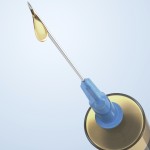
Because of its age and ‘older technology’, it is the least expensive of the many types of injectable fillers currently available.. But it has two distinct disadvantages…Unfortunately, around 3 to 6 percent of people will develop an allergic reaction due to the differences between human and cow collagen. As a result, everyone must have a skin test prior to an injection session. Only if no reaction is observed at the injection site after four weeks should one be injected. Unfortunately still, some patients who have had a negative skin test will still go on to have an allergic reaction. Because of these potential allergic reactions, people with connective tissue diseases such as rheumatoid arthritis, lupus, scleroderma and dermatomyositis should never receive bovine collagen injections. The second disadvantage is that it doesn’t last very long, usually only 6 to 12 weeks. It is rapidly broken shortly after being injected as the body’s enzymes do not recognize it as ‘self’ and begins dissolving it fairly quickly.
While pure bovine collagen injections are almost of historic significance only, being surpassed by every new injectable filler in terms of longevity and less reactivity, it has established some important principles to which modern-day injectable fillers should strive to achieve. These include the ease of injection through a very small (30 gauge) needle, the combination with the local anesthetic lidocaine, and establishing the public’s awareness of the simplicity and effectiveness of cosmetic injection therapy.
Dr. Barry Eppley
Indianapolis, Indiana


